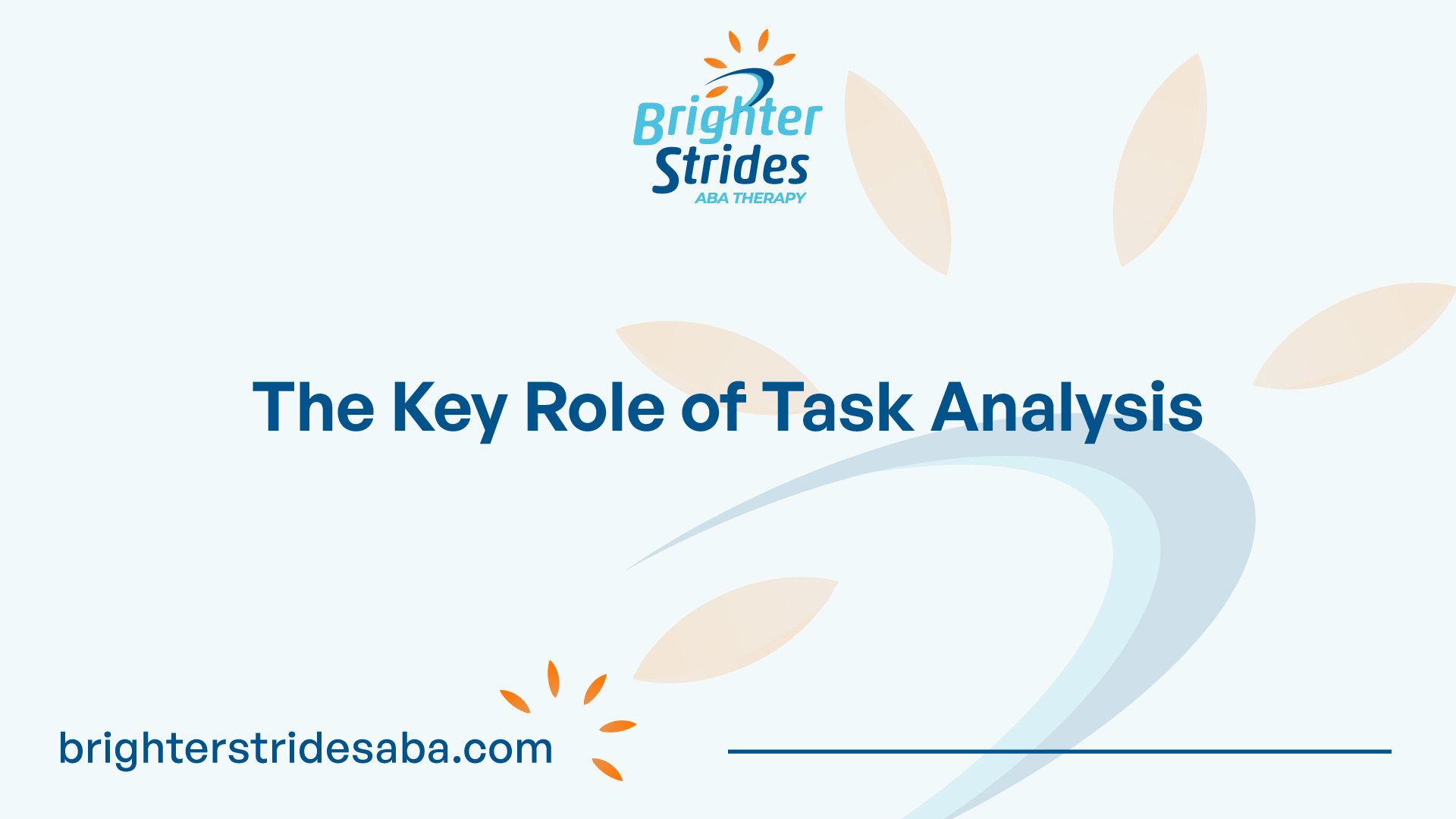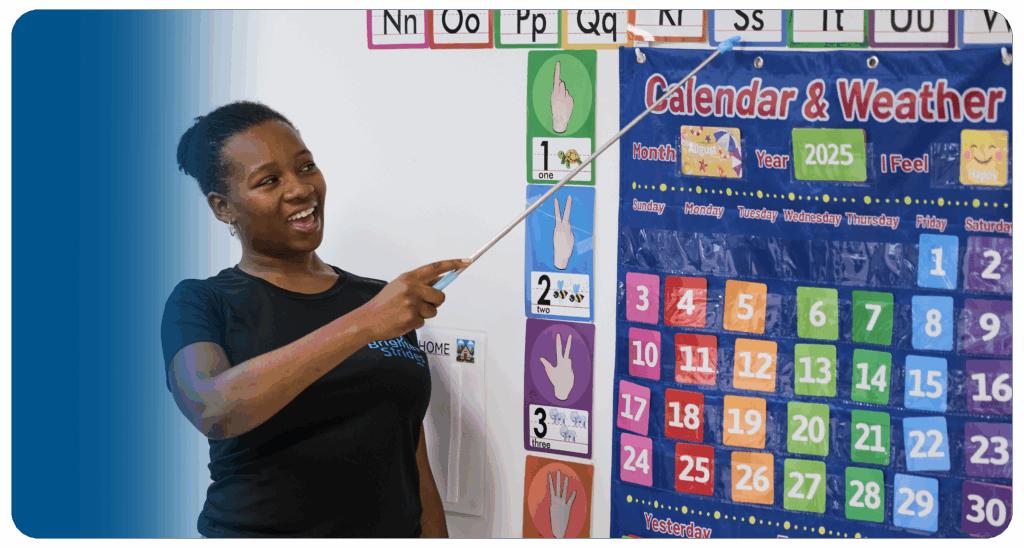Understanding Task Analysis in ABA Therapy
Task analysis is a fundamental component of Applied Behavior Analysis (ABA) therapy that plays a critical role in the success of therapy sessions. It involves breaking down complex tasks into smaller, sequential steps, allowing individuals to learn and master new skills more effectively. By providing a clear roadmap for teaching, task analysis helps therapists and practitioners create customized teaching programs tailored to the abilities and learning styles of individuals receiving therapy [1].

Definition and Importance
Task analysis in ABA therapy refers to the process of analyzing and breaking down a skill or task into its component steps. Each step is then taught systematically, ensuring that individuals understand and can successfully complete each part before progressing to the next. This approach allows therapists to provide targeted and individualized instruction, promoting skill acquisition and overall success.
The importance of task analysis lies in its ability to make complex tasks more manageable. For individuals with Autism Spectrum Disorder (ASD), who often benefit from structured and organized teaching methods, task analysis provides a systematic approach that reduces overwhelm and fosters successful learning experiences. By breaking down skills into smaller steps, therapists can ensure that individuals focus on one component at a time, facilitating better understanding and retention.
Benefits of Task Analysis
Task analysis offers several benefits in the context of ABA therapy. By breaking down complex tasks into smaller, more manageable steps, therapists can provide clear and explicit instructions, ensuring that individuals understand and can follow each step. This promotes independence and reduces the likelihood of errors or frustration.
Moreover, task analysis allows therapists to identify specific skills that need to be targeted, ensuring that therapy sessions are focused and effective. By customizing teaching programs based on the abilities and learning styles of individuals, therapists can provide individualized instruction that maximizes learning potential.
The benefits of task analysis extend beyond the therapy session itself. By teaching skills systematically, individuals are more likely to generalize those skills to real-life situations. This promotes independence and empowers individuals to apply their learned skills in various contexts.
In summary, task analysis plays a critical role in ABA therapy by breaking down complex skills into smaller, manageable steps. It allows therapists to provide individualized instruction, promotes skill acquisition, and fosters independence and success. By implementing task analysis, therapists can create structured and effective therapy programs that cater to the unique needs of individuals receiving therapy.
Implementing Task Analysis
To effectively implement task analysis in ABA therapy, therapists utilize customized teaching programs and tailor their teaching strategies to meet the individual needs of the learners.
Customized Teaching Programs
Task analysis allows ABA therapists to create customized teaching programs that are tailored to the abilities and learning styles of individuals receiving therapy. By breaking down complex skills into smaller, more manageable steps, therapists can identify specific skills that need to be targeted and develop a clear roadmap for teaching those skills systematically [1].
These teaching programs are designed to promote skill acquisition by providing structured and individualized instruction. ABA therapists use task analysis to teach a wide range of skills, including daily living skills, communication and language skills, academic skills, and social skills [2]. By customizing the teaching program to the unique needs of each learner, therapists can facilitate the learning process and help individuals progress towards their goals.
Tailoring Teaching Strategies
In addition to customized teaching programs, ABA therapists also tailor their teaching strategies based on the unique needs and abilities of each learner. By understanding the strengths and challenges of the individual, therapists can modify their approach to maximize learning outcomes.
Tailoring teaching strategies involves considering factors such as the learner’s preferred learning style, motivation, and sensory needs. Some learners may respond better to visual cues, while others may benefit from hands-on activities. By adapting teaching methods to suit the learner’s preferences, therapists can optimize engagement and promote skill acquisition.
Furthermore, ABA therapists use task analysis to reduce errors and foster independence. By breaking down skills into smaller steps, learners can master each step before moving on to the next, minimizing errors and building confidence. This systematic approach promotes a sense of accomplishment and empowers individuals to become more independent in performing the targeted skills.
Implementing task analysis in ABA therapy requires an individualized approach, where teaching programs and strategies are tailored to the unique needs and abilities of each learner. This enables therapists to provide targeted interventions and ensures systematic progress tracking [2]. By customizing teaching programs and tailoring teaching strategies, ABA therapists can maximize the effectiveness of task analysis and facilitate skill acquisition in individuals receiving therapy.
Task Analysis Strategies
In the realm of ABA therapy, task analysis is a powerful and versatile approach that plays a key role in teaching individuals with developmental disabilities a wide range of skills. By breaking down complex tasks into smaller, more manageable steps, task analysis enables effective skill acquisition and promotes independence. Two essential strategies within task analysis are breaking down complex tasks and sequencing steps logically.
Breaking Down Complex Tasks
Breaking down complex tasks into smaller steps is a fundamental strategy in task analysis. By deconstructing a complex task into its individual components, individuals with developmental disabilities can better understand and learn each step more effectively. This approach minimizes confusion and overwhelm, allowing learners to focus on mastering one step at a time.
For example, if the task is brushing teeth, it can be broken down into smaller steps such as wetting the toothbrush, applying toothpaste, brushing the upper teeth, brushing the lower teeth, rinsing the mouth, and rinsing the toothbrush. By breaking down the task, learners can focus on each step and gradually build their skills towards completing the entire task independently.
Sequencing Steps Logically
Sequencing steps logically is another crucial aspect of task analysis. Once the individual steps of a task have been determined, arranging them in a logical order ensures a smooth and efficient learning process. This sequence allows learners to understand the flow and progression of the task, making it easier to follow and replicate.
When sequencing steps, it’s important to consider the natural order of the task and any dependencies between steps. For instance, in the context of making a sandwich, the logical sequence would involve steps such as gathering ingredients, spreading condiments, adding fillings, and finally, slicing the sandwich. This logical progression allows learners to grasp the overall structure of the task and develop a clear understanding of the steps involved.
Providing visual supports, such as written instructions, pictures, or visual schedules, can also aid in sequencing steps logically. These visual aids reinforce understanding and promote independence, allowing individuals to refer back to the steps as needed and successfully navigate through the task.
By employing these task analysis strategies of breaking down complex tasks and sequencing steps logically, ABA therapists can effectively teach a wide range of skills to individuals with developmental disabilities. These strategies not only facilitate skill acquisition but also reduce errors, foster independence, promote generalization, and enable effective data collection and progress monitoring, enhancing the overall learning experience.
Task Analysis in Skill Acquisition
Task analysis is a fundamental component of Applied Behavior Analysis (ABA) therapy, playing a vital role in teaching individuals various skills. By breaking down complex tasks into smaller, more manageable steps, ABA therapists can effectively teach a wide range of skills, including daily living skills and communication skills.
Teaching Daily Living Skills
One area where task analysis proves particularly valuable is in teaching daily living skills to individuals receiving ABA therapy. Daily living skills encompass a range of activities necessary for independent functioning and self-care. By breaking these skills down into smaller, sequential steps, individuals can focus on mastering one component at a time, reducing overwhelm and promoting successful learning experiences.
Examples of daily living skills that can be taught using task analysis include brushing teeth, bathing, dressing, meal preparation, and morning routines. Through a systematic approach, individuals with developmental disabilities can acquire these skills and gain greater independence in their daily lives [3].
Enhancing Communication Skills
Task analysis is also highly effective in enhancing communication skills, another critical area of focus in ABA therapy. Communication skills encompass various aspects, such as expressive language, receptive language, and social communication. By breaking down these skills into smaller steps, therapists can systematically teach and reinforce specific communication behaviors.
For example, when teaching expressive language, task analysis may involve breaking down the process of forming a sentence into steps like selecting words, arranging them in the correct order, and articulating the sentence. By targeting each step individually, individuals can develop their language skills incrementally.
Similarly, for receptive language skills, task analysis can involve breaking down the process of following instructions into smaller steps, such as attending to the speaker, comprehending the words, and executing the action. By systematically teaching these steps, individuals can improve their ability to understand and follow instructions.
By incorporating task analysis into ABA therapy, therapists can provide a structured and organized approach to teaching and reinforcing communication skills, promoting effective communication and social interactions.
Task analysis is a versatile and evidence-based approach to skill acquisition in ABA therapy, allowing therapists to tailor teaching programs to the unique needs and learning styles of individuals. By breaking tasks into sequential steps, therapists can systematically teach a wide range of skills, including daily living skills and communication skills. This approach promotes independence, success, and overall progress in individuals receiving ABA therapy.
Individualized Approach
In the realm of ABA therapy, task analysis plays a vital role in breaking down complex skills or tasks into smaller, more manageable steps. However, it is important to recognize that task analysis should be approached with an individualized perspective, taking into account the unique needs of each individual.
Tailoring to Unique Needs
Implementing task analysis in ABA therapy requires an individualized approach. Factors such as the skill level of the person, age, communication and processing abilities, and prior experiences must be considered when tailoring task analysis [3]. Accounting for these individual differences helps ensure that the task analysis is appropriately designed to meet the specific needs and abilities of the individual.
By tailoring the task analysis to the unique needs of each person, ABA therapists can create a customized teaching program that maximizes learning potential. This approach enables therapists to address specific skill deficits and target areas that require additional support, ultimately leading to more effective skill acquisition.
Data Collection and Progress Monitoring
Data collection and progress monitoring are essential components of implementing task analysis in ABA therapy. By systematically collecting data on the individual’s progress, therapists can track skill acquisition and make informed decisions regarding the effectiveness of the intervention.
Through ongoing data collection and progress monitoring, ABA therapists can identify areas of improvement, modify teaching strategies as needed, and assess the effectiveness of the task analysis program. This data-driven approach ensures that interventions are evidence-based and tailored to the individual’s progress and needs.
Regular data collection also allows for objective measurement of the individual’s progress over time. This information can be used to communicate with parents, caregivers, and other professionals involved in the individual’s care, fostering collaboration and ensuring a comprehensive approach to intervention.
By tailoring task analysis to the unique needs of each individual and implementing data collection and progress monitoring, ABA therapists can provide personalized interventions that promote skill development and progress. This individualized approach helps individuals with developmental disabilities acquire new skills in a systematic and effective manner.
Ensuring Skill Generalization
In ABA therapy, skill generalization is a key goal, as it involves applying learned skills to real-life situations and contexts. Task analysis, a fundamental component of ABA therapy, plays a crucial role in facilitating skill generalization by breaking down complex tasks into smaller, manageable steps. Two important aspects of ensuring skill generalization are reinforcement strategies and real-life application.
Reinforcement Strategies
Reinforcement strategies are essential in ABA therapy to reinforce and strengthen desired behaviors. When it comes to skill generalization, utilizing effective reinforcement strategies can help individuals transfer learned skills from therapy settings to real-life situations. Positive reinforcement, such as praise, rewards, or tokens, can motivate individuals to apply their skills outside of therapy sessions.
It is important to identify meaningful reinforcers that are relevant to the individual’s interests and preferences. By using personalized and motivating reinforcers, therapists can increase the likelihood of skill generalization. The consistent use of reinforcement, along with clear expectations and positive feedback, enhances the individual’s confidence and encourages the application of newly acquired skills in various environments.
Real-Life Application
Real-life application is a critical aspect of skill generalization in ABA therapy. It involves teaching individuals how to apply their learned skills in natural settings and everyday situations. By incorporating real-life scenarios into therapy sessions, individuals can practice applying their skills in a context that closely resembles their daily lives.
Therapists can use various techniques to promote real-life application, such as role-playing, simulated activities, and community outings. These activities allow individuals to practice their skills in authentic situations, interacting with different people and dealing with real-world challenges. By gradually increasing the complexity and variability of the tasks, individuals develop the ability to generalize their skills across a range of contexts.
Furthermore, involving family members, caregivers, and other significant individuals in the therapy process can facilitate skill generalization. By providing guidance and support outside of therapy sessions, these individuals can reinforce and promote the application of learned skills in the individual’s day-to-day life.
By combining reinforcement strategies and real-life application, ABA therapists can maximize skill generalization. This ensures that individuals are not only able to demonstrate their skills within the therapy setting but also transfer and apply those skills to real-world situations. By promoting independence and success in various environments, skill generalization enables individuals to lead more fulfilling and functional lives.




